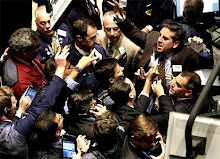ThinkEquity LLC, the San Francisco-based investment bank, said yesterday its stock-trading business will close. Oscar Gruss & Son Inc. halted merger-arbitrage operations on Oct. 12. Rodman & Renshaw LLC, which acquired brokerage Hudson Holding Corp. last year, told regulators in a September filing that it didn’t have enough capital and would stop trading.
“It’s an impossibly tough business,” Greg Wright, chief executive officer of ThinkEquity, said yesterday in a telephone interview. “There aren’t enough commission dollars today for the number of market participants so there will be further consolidation.”
Nomura Holdings Inc. (8604), Auriga Holdings LLC, Pritchard Capital Partners LLC, WJB Capital Group Inc., Ticonderoga Securities LLC and Kaufman Bros. LP have also fired equity traders or shut their doors this year.
With most stock trading handled by computers, the sales staff who work the phones for small securities firms generally make money by sending investment ideas to money managers. They trust the investors to reciprocate by paying for trading services or sending cash later.
Sales Ethics
“It doesn’t really take much talent to buy 100,000 shares of Wal-Mart,” said Sean Gambino, who trades consumer stocks for Schottenfeld Group LLC. “There’s a code of ethics that says, ‘I’m using their information, they’re giving it to me, I’ll trade through them.’”Regulations that went into effect in 2007 increased competition among exchanges and drove brokers to boost their use of algorithms to execute client orders. Brokers who trade manually charge about twice as much as those who use algorithms, or software systems that break blocks into smaller pieces, according to Tabb Group LLC. Money managers pay about 7.3 cents to trade $100 of stock, down from 10.6 cents three years ago, ITG data show.
“Commissions are set by the customer and unfortunately they’re setting them lower each quarter,” said Tommy Pritchard, who left his eponymous investment bank in April to join Imperial Capital Group Inc.
Trading Less
Pritchard, a firm that once employed as many as 60 people, profited more from investment-banking fees than trading, he said. It closed in June as the pace of stock offerings by energy companies slowed, Pritchard said.Investors are trading less even as stocks rise. Average daily volume for U.S. equities fell to 6 billion shares in the third quarter from 8.7 billion a year earlier and 9.3 billion in the same period of 2009. The Standard & Poor’s 500 Index has gained about 16 percent this year.
Equities firms split $10.9 billion in fees last year from asset managers, the least since 2006, according to data compiled by Greenwich Associates. Asset managers consolidated more of their trading with larger brokers to ensure they kept getting research, advice and access to deals, the firm said in May.
Difficult Environment
“A lot of people were hoping that we’d get a better recovery than we got and went out and invested,” said Packy Jones, chairman of JonesTrading Institutional Services LLC, a Westlake Village, California-based broker. “Now with the volumes drying up, it’s been difficult for a lot of these brokerage firms to make money.”The decline in commissions has hit even larger firms. Goldman Sachs Group Inc., the fifth-biggest U.S. bank by assets, collected $5.91 billion of revenue from equities trading in the first nine months of this year, down 10 percent from a year earlier as commission and fee revenue tumbled 18 percent. The firm handles “the vast majority” of client trades electronically today, a change from 10 years ago when most were handled by phone, Chief Financial Officer David A. Viniar said in February.
Interactive Brokers Group Inc., which sells computerized trading services to individuals and hedge funds, has benefited from the trend. It had pretax profit of $741.1 million last year, the most since 2008, according to data compiled by Bloomberg. Steve Sanders, senior vice president of business development for the firm, said he’s gaining business as institutional clients pay more attention to costs.
“A good deal of this industry’s business has been through personal relationships,” Sanders said. “That’s changing. I don’t think people can justify the higher costs anymore.”
Tom Laresca, who traded non-U.S. stocks for New York-based Rodman & Renshaw, said sales staff there relied on relationships with money managers that went back years or decades.
“It was much easier five years ago,” Laresca said. “It seems like everybody’s fighting for the same dime these days.”


No comments:
Post a Comment